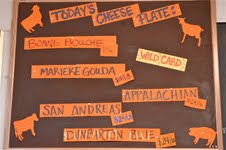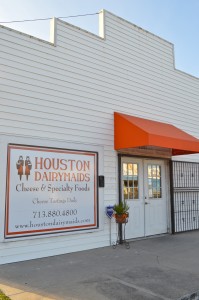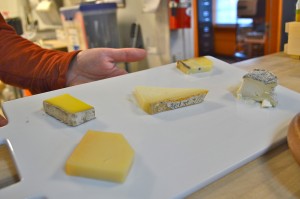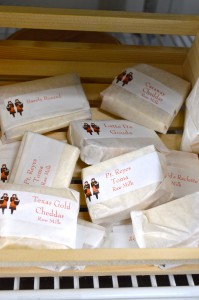Interview with Lindsey Schechter, Houston Dairymaids
Interview date: February 2013
Written by Jamie Glover-Dabbs
Why Cheese?
I’ve always been sort of obsessed with food from a very young age and I worked nearly every job in the food industry before discovering the niche of cheese. I loved not only eating it, which was my first love of cheese, but as I got to know the cheese makers I love the way they work and their commitment to make a great product. I think small-format cheese making is great for the land, the animals and the people eating the cheese so I saw no downside and, so, fell in love with that aspect of it.
What was the first food experience you remember? Or that sticks out in your memory?
Well, I’m a vegetarian now, so it’s surprising that what I remember is being in Italy and being tasting Lardo for the first time really thin slivers of Lardo that melted on my tongue – I was really taken away with that.
When you first got into the industry did you meet a small format cheese maker that got you interested in distribution?
I was in Manhattan at the time and I happened I happened to get all the cheese stories at the magazine I was working at which was really tough – Food Arts Magazine – then I was lucky enough to be sent on a trip to Italy with Lou Di Palo of Di Palo’s in New York and he was our tour guide and he took us through Northern Italy eating cheese and prosciutto and he really made me understand. We became fast friends and I would just go into his shop and hang out all day long and just watch the dynamics of the shop and just fell in love with the talk over the counter – just sharing the stories of the cheese and the cheese makers – how he brought back his experience in Italy to these customers in New York and I love the magic of that.
So, do you try to recreate in your own store, that big world to neighborhood customer format?
Our concept is to really step up and be the mouthpiece for the cheese makers that can’t be here and in some ways I feel like we’re in a better position to sing their praises because it’s hard for a cheese maker to talk about how great their own cheese is – it’s a very personal thing and it can sound immodest, but we can go on and on singing their praises and telling the stories of their farm and operation.
Do you go out and meet the cheese makers as you incorporate their cheeses into your portfolio?
We do. Unfortunately, I am at the farms less and less, but Dairymaids, depending on which of the farms, is at the farms on a bi-weekly or monthly basis and seeing what has changed on the farm, what new cheeses they have.
How many farms do you collect from?
The number changes, but I think right now we’re at 12 Texas cheese makers and we are picking up from seven or eight – a few of them ship to us.
Since you’re in touch with this vast network of cheese makers throughout the country, what obstacles do you see for small-batch cheese makers nationally and in Texas?
I think the cheese makers that try – we really like our farmstead cheese makers, but we see that to raise the animals, make the cheese, and then do the marketing and distribution are too many jobs for one family or group of people so I think it gets overwhelming.
And you see your organization filling that role.
Yeah, I think Jasper Hill in Vermont has gone in and taken that on with aging, distribution, and marketing for a lot of cheese makers. I think we can see in Europe that the cheese maker has been more successful not playing all of those roles.
It’s interesting that you brought Jasper Hill because there really aren’t many affineurs in the US. Do you think we’ll see a change in that?
I think if they continue to show the success that they are showing I think that model will encourage other producers to replicate that model throughout the country. There’s definitely room for that to be replicated throughout the US. I think ‘Whom should be doing the aging?’ is a hot debate – whether it’s best done by a cheese maker or by a cheese monger, but I do hope that that model appears in more areas of the country – I think that model will help move a lot of US cheese making forward.
My understanding is that a lot of the first cheese caves from Grecian times were made of limestone and I think it’s funny considering how much limestone Texas has; do you think we’ll see a growth of aged cheeses in Texas?
I certainly hope so. And I think that as the market becomes crowded with more cheese makers I think they are going to have to differentiate themselves by making different cheeses, especially the goat cheese makers. There’s a lot of fresh goat cheese on the market. The more they differentiate, the more viability their businesses will have.
In terms of cheese mongers aging cheeses, do you think you’ll ever take that role on?
I don’t. I really think it’s best left in the hands of the cheese makers right now. The knowledge and the equipment needed aren’t readily accessible to me right now. Maybe… that’s not true. I wouldn’t be confident enough to take a cheese makers cheese and try to act on it in any way. Our role is to trust them to give it to us at where they want to be and to preserve it until it gets into the consumers mouth.
You do a TON of retail cheese to local restaurants in Houston. Tell us how you got started seeking out individual people. How did you get from your job from Manhattan to this role in Houston?
I cooked for a long time so I am very comfortable with chefs – I love talking to chefs and so when it came to cold-calling at the back of restaurant doors that didn’t intimidate me at all – those were my folks. When we started at the farmers market, chefs were approaching us at our stall and that is what showed us that it would be viable to start wholesaling. It also made sense given that it was a lower startup cost that we wouldn’t have to provide a retail space in the beginning. We were able that way to build volume. After New York, I lived in Maine and briefly owned a restaurant there where I had a local cheese plate on the menu and through that, got to know all the local cheese makers, and gained an understanding I didn’t have before about how they operate and the challenges they face in getting their cheeses to their markets – especially in the rural markets – how much shipping cost – **There are no non-rural areas in Maine** Haha! It’s true. So, if one restaurant wanted a half-wheel of cheese that would be difficult – that was when the light bulb went off. I thought it would be a fun role to take and then I discovered Neal’s Yard Dairy in London and that is their model. They travel around England bringing back cheeses to London and was able to go there for six weeks and see how they did it. I came back and copied their model.
What did you learn there? What were your big takeaways?
Besides that cheese mongers at Neal’s Yard Dairy are the best people ever, so open. When you are around a group that is so passionate about cheese you just have fun all the time. There’s just endless cheese talk… But they hold their standards so high and they are masters at customer service so that’s really where it hit home how important it is for the customer to taste cheese and how important it is for you to talk to them about what they are tasting. Rather than just having them grab it off the shelf.
It seems that you’ve integrated that into your business as well. There are little samples out all over your shop.
It works well and cheese is not cheap. We want people to go home with something that suits their liking. We feel that having our organized tastings on a daily basis we are offering a mini-cheese education every time someone walks into the shop.
When you spent time at Neal’s Yard Dairy did you make any connections with people you keep in touch with?
I ran into some people at the last American Cheese Society Conference. A lot of those people that were up there with me were interns and have remained in the food world.
Tell us a little bit about your American Cheese Society experience.
ACS has a conference every year and I’ve been going for seven or eight years now. It’s now, more than anything, a great opportunity to see people that you only get to see once a year as well as an opportunity to discover new cheeses. Two years ago I was invited to be a judge which was very exciting and educational for me. Working with technical judges and understanding how they look at cheeses really tested my ability to articulate and critique a cheese.
How many cheeses did you judge?
They usually have a little over a thousand entrants. They break it into 14 teams and each team has roughly a hundred and you are assigned categories. Every judge has to taste all the 1st place cheeses in each category – it’s a real test of your endurance.
Did you get to meet/talk to the other judges? Did you find their background matched up with yours?
Half of them are food scientists and technical judges and half of them are aesthetic judges who sell cheese / are cheese mongers so there are some incredible cheese people in that group every year so it’s great to be around them.
Food scientists are an interesting topic to bring up because that’s a really recent field of people that have been added to the food industry. What are your thoughts on that position? Being a cheese monger and making cheese is a really old profession…
I find it fascinating what they’ve been able to do in terms of breaking down the flavors of grass-fed animals versus non-grass feeding. They correspond in chemical makeup to specific flavor profiles. It’s fascinating, really. ** Can you elaborate on that example? What flavors do you pick up on a grass-fed animal?** It’s easier to pick up on pasteurized versus non-pasteurized. Pasteurized has an extra bit of sweetness, like a caramelization of the sugars in the milk. It’s amazing that these folks do NOTHING but study this all day long.
You sell a number of raw cheeses here.
We kind of show a preference for raw cheeses.
Has your market responded to that?
Yeah, I think they appreciate it. I don’t know we get so many people that are specifically seeking out raw cheese, but they do appreciate the ability to purchase raw cheeses. It’s a signifier that it’s a smaller batch, farmstead cheese.
Do you find that it’s smaller farms that do make raw cheeses or does it run the gamut?
I guess it runs the gamut, although it’s fortunate that if you are making raw cheeses you don’t have to purchase an expensive pasteurizer.
Do you have any requests from your restaurants requesting raw cheeses or pasteurized cheeses?
No, you know, at times, there’s a bit of nervousness about serving raw milk cheeses and we let them know what the laws are and why it’s OK. There’s sometimes a misunderstanding with the raw milk cheeses in this country. There’s a 60 day law; if a cheese is aged for 60 days then it’s legal for it to be made with raw milk. Your younger cheeses – your fresh chevre, for instance, will be pasteurized – but your aged cheeses, lower moisture cheeses, can be made with raw cheeses.
Can you tell us where you see Dairymaids in 5-10 years?
I’ve been so pleased with the way the business has developed organically and it’s been developed by the talented people who have come to work here and we’ve even so lucky that we have been in the retail side for over a year and we are loving it. It gives us a different opportunity to talk to people and a lot of chefs come in to do the tasting as well so its another avenue for us to work with our chef customers so we want to build on that and keep improving our little building and property.
What prompted you to incorporate retail?
We’ve always sold out at the farmers markets and its tough in the middle of the August, to sell cheese, we kept having people show up at the warehouse and we decided to give it a shot. We started with just the weekends and are now six days a week and it’s getting more and more steady as people come to know that we are open.
Who are the crucial members of your team?
Raymundo is our driver and he has the most contact with the cheese makers in person because he goes to pick up the cheese and does all the deliveries. Elizabeth does our wholesale with the help of Shannon and Haley runs our retail side. We also have a talented group of part-timers who assist with retail and events.
What events are you excited about?
We are thrilled to be offering a year of events, pre-planned. We do two big tastings with Saint Arnold Brewery and we do events throughout the year with our restaurant customers. The Tasting Room event we host every October.
In 10 years, do you see yourself in the shop? What DO you see?
I think we want to continue to build our expertise and to build on what we know about cheese. We want to find these gems throughout the country. Nothing excites us more than finding a new cheese or cheese maker. I don’t know what the size of the company will be, but I know our goal is to find those cheeses and share them with our community.
Our audience is filled with cheese lovers, cheese mongers, industry friends – do you have anything you want to share with them?
I am honored to be in this group of people – it is truly a privilege.
Do you see any great new cheeses coming our in the Texas or National market that are of note? Anyone to keep our eye on?
I’m really impressed with the aged cheeses that are coming out of Latte da Dairy in Flower Mound. Her gouda is delicious and she is still very small production, but the quality is great. Eagle Mountain is showing a lot of promise with all their cheeses, especially their Raclette, a unique flavor profile in the Texas market. And we always have our superstars, the Veldhuizens, the Mozzarella Company, Pure Luck are all making great cheese.
How did started Dairymaids start?
We came and started the business not really knowing what there was concerning Texas cheese makers. Then we discovered Pure Luck, the Veldhuizen’s, etc. I remember the first order we made from the Veldhuizen’s was 3 wheels and we brought it to our first farmers market and immediately sold out of all three wheels. We couldn’t have been happier. I remember calling Stuart and saying that we were coming back and going to stock up. So, Monica announced that we would be there at that market and we were swamped from day one. Before that, there was only a small amount of Texas cheese making it into Houston. Then we spread out to a second farmers market – the Rice market on Tuesdays. We grew through there and from that, we were able to identify small cheese makers and grow from there.
Are there a lot of Texas cheese makers that you don’t carry?
Yes, some of them are so small that they are selling out directly in their own area – some of them we don’t carry because they duplicate cheeses we already sell. We don’t want to take away from that business.
About the writer: JAMIE GLOVER-DABBS
Jamie Glover-Dabbs is a fourth generation Houstonian and the Director of Social Media for Lasco Enterprises, the restaurant group who owns three locations of The Tasting Room in Houston, four locations of MAX’s Wine Dive in Houston, Austin, San Antonio, and San Antonio, and Boiler House Texas Grill & Wine Garden in San Antonio. She has interned at Blue Heron Farm, works part time as a cheese monger at the Houston Dairymaids, and is an avid cheese maker in her spare time.
LINKS:
Jamie Glover-Dabbs
Lasco Enterprises
The Tasting Room
MAX’s Wine Dive
Boiler House
Blue Heron Farm
Houston Dairymaids
PHOTO CREDITS: Jamie Glover-Dabbs and Houston Dairymaids
![IMG_9640[2]](http://texascheesetour.com/wp-content/uploads/2014/06/IMG_964021-199x300.jpg)
![260[2]](http://texascheesetour.com/wp-content/uploads/2014/06/2602-199x300.jpg)




